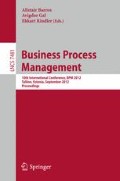Abstract
Dependencies among software artifacts are very useful for various software development and maintenance activities such as change impact analysis and effort estimation. In the past, the focus on artifact dependencies has been at the design and code level rather than at the requirements level. This is due to the difficulties in identifying dependencies in a text-based requirements specification. We observed that difficulties reside in the disconnection among itemized requirements and the lack of a more systematic approach to write text-based requirements. Business process models are an increasingly important part of a requirements specification. In this paper, we present a mapping between workflow patterns and dependency types to aid dependency identification and change impact analysis. Our real-world case study results show that some participants, with the help of the mapping, discovered more dependencies than other participants using text-based requirements only. Though many of these additional dependencies are highly difficult to spot from the text-based requirements, they are however very useful for change impact analysis.
Access this chapter
Tax calculation will be finalised at checkout
Purchases are for personal use only
Preview
Unable to display preview. Download preview PDF.
References
Lehman, M.M., Ramil, J.F., Wernick, P.D., Perry, D.E., Turski, W.M.: Metrics and laws of software evolution-The nineties view. In: Proc. 4th Intl. Software Metrics Symp., pp. 20–32. IEEE Computer Society Press (1997)
Arnold, R.S., Bohner, S.A.: Software Change Impact Analysis. Wiley-IEEE Computer Society (1996)
Bohner, S.A.: Software change impacts-an evolving perspective. In: Int. Conf. Softw. Maintenance (ICSM 2002), pp. 263–272. IEEE Computer Society Press (2002)
Fasolino, A.R., Visaggio, G.: Improving software comprehension through an automated dependency tracer. In: Proc. 7th Int. Wkshp. Program Comprehension, pp. 58–65. IEEE Computer Society Press (1999)
De Lucia, A., Fasano, F., Oliveto, R.: Traceability management for impact analysis. In: Frontiers of Software Maintenance (FoSM 2008), pp. 21–30. IEEE Press (2008)
Aizenbud-Reshef, N., Nolan, B.T., Rubin, J., Shaham-Gafni, Y.: Model traceability. IBM Syst. J. 45(3), 515–526 (2006)
Dag, J., Regnell, B., Carlshamre, P., Andersson, M., Karlsson, J.: A feasibility study of automated natural language requirements analysis in market-driven development. Requirements Engineering 7, 20–33 (2002)
Pohl, K.: PRO-ART: Enabling requirements pretraceability. In: 2nd Int. Conf. Requirements Eng., pp. 76–84. IEEE Computer Society Press (1996)
Li, J., Zhu, L., Jeffery, R., Liu, Y., Zhang, H., Wang, Q., Li, M.: An initial evaluation of requirements dependency types in change propagation analysis. In: 16th Int. Conf. Evaluation & Assessment in Softw. Eng., EASE 2012 (2012)
Larkin, J.H., Simon, H.A.: Why a Diagram is (Sometimes) Worth Ten Thousand Words. Cognitive Science 11, 65–100 (1987)
Object Management Group: Business Process Modeling Notation Specification v1.2 (2009)
Hassine, J., Rilling, J., Hewitt, J., Dssouli, R.: Change impact analysis for requirement evolution using use case maps. In: 8th Int. Wkshp. Principles of Software Evolution, pp. 81–90. IEEE Computer Society Press (2005)
von Knethen, A., Grund, M.: QuaTrace: a tool environment for (semi-) automatic impact analysis based on traces. In: Int. Conf. Softw. Maintenance (ICSM 2003), pp. 246–255. IEEE Computer Society Press (2003)
Dahlstedt, Å., Persson, A.: Requirements Interdependencies: State of the Art and Future Challenges. In: Engineering and Managing Software Requirements, pp. 95–116. Springer, Berlin (2005)
Yan, Y.-Q., Li, S.-X., Liu, X.-M.: Quantitative Analysis for Requirements Evolution’s Ripple-Effect. In: Int. Asia Conference on Informatics in Control, Automation and Robotics (CAR 2009), pp. 423–427. IEEE Computer Society Press (2009)
de la Vara González, J.L., Díaz, J.S.: Business process-driven requirements engineering: a goal-based approach. In: Pernici, B., Gulla, J.A. (eds.) Proc. CAiSE 2006 Workshops (vol. 1) - 8th Wkshp. Business Process Modeling, Development, and Support (BPMDS 2007), Trondheim, Norway (2007)
Cardoso, E.C.S., Almeida, J.P.A., Guizzardi, G.: Requirements engineering based on business process models: A case study. In: 13th Enterprise Distributed Object Computing Conference Workshops (EDOCW 2009), pp. 320–327. IEEE Computer Society Press (2009)
Mathisen, E., Ellingsen, K., Fallmyr, T.: Using business process modelling to reduce the effects of requirements changes in software projects. In: 2nd Int. Conf. Adaptive Science & Technology (ICAST 2009), pp. 14–19. IEEE Computer Society Press (2009)
van der Aalst, W.M.P., ter Hofstede, A.H.M., Kiepuszewski, B., Barros, A.P.: Workflow patterns. Distributed and Parallel Databases 14, 5–51 (2003)
Wohed, P., Russell, N., ter Hofstede, A.H.M., Andersson, B., van der Aalst, W.M.P.: Patterns-based evaluation of open source BPM systems: The cases of jBPM, OpenWFE, and Enhydra Shark. Information and Software Technology 51, 1187–1216 (2009)
Kous, K.: Comparative analysis versions of BPMN and its support with Control-flow patterns. In: MIPRO, 2010 Proc. 33rd Int. Convention, pp. 315–319. IEEE Computer Society Press (2010)
Object Management Group: OMG Systems Modeling Language (OMG SysMLTM) v1.2 (2011)
Author information
Authors and Affiliations
Editor information
Editors and Affiliations
Rights and permissions
Copyright information
© 2012 Springer-Verlag Berlin Heidelberg
About this paper
Cite this paper
Li, J. et al. (2012). A Business Process-Driven Approach for Requirements Dependency Analysis. In: Barros, A., Gal, A., Kindler, E. (eds) Business Process Management. BPM 2012. Lecture Notes in Computer Science, vol 7481. Springer, Berlin, Heidelberg. https://doi.org/10.1007/978-3-642-32885-5_16
Download citation
DOI: https://doi.org/10.1007/978-3-642-32885-5_16
Publisher Name: Springer, Berlin, Heidelberg
Print ISBN: 978-3-642-32884-8
Online ISBN: 978-3-642-32885-5
eBook Packages: Computer ScienceComputer Science (R0)

